上海外国语大学 俄语语言学博士 英语(二外)
- 格式:pdf
- 大小:278.25 KB
- 文档页数:6
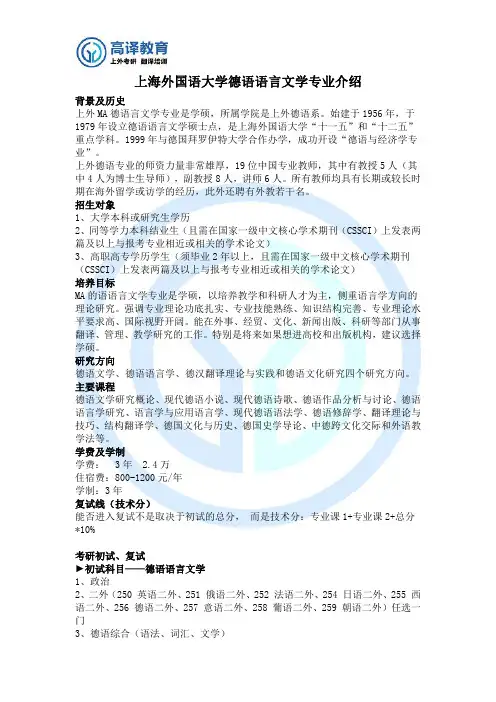
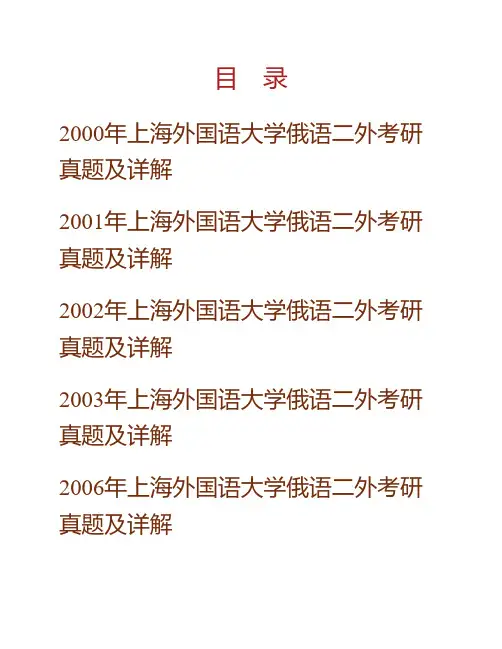
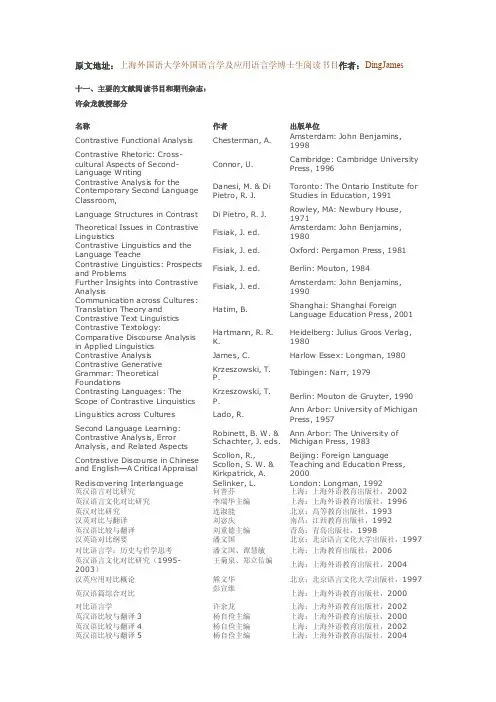
原文地址:上海外国语大学外国语言学及应用语言学博士生阅读书目作者:DingJames 十一、主要的文献阅读书目和期刊杂志:9许余龙教授部分名称5作者出版单位Contrastive Functional Analysis Chesterman, A.Amsterdam: John Benjamins,1998Contrastive Rhetoric: Cross-cultural Aspects of Second-Language Writing Connor, U.Cambridge: Cambridge UniversityPress, 1996Contrastive Analysis for the Contemporary Second Language Classroom,Danesi, M. & DiPietro, R. J.Toronto: The Ontario Institute forStudies in Education, 1991Language Structures in Contrast Di Pietro, R. J.Rowley, MA: Newbury House, 1971Theoretical Issues in ContrastiveLinguistics Fisiak, J. ed.Amsterdam: John Benjamins, 1980Contrastive Linguistics and theLanguage Teache Fisiak, J. ed.Oxford: Pergamon Press, 1981Contrastive Linguistics: Prospects and Problems Fisiak, J. ed.Berlin: Mouton, 1984Further Insights into Contrastive Analysis Fisiak, J. ed.Amsterdam: John Benjamins,1990Communication across Cultures:Translation Theory and Contrastive Text Linguistics Hatim, B.Shanghai: Shanghai ForeignLanguage Education Press, 2001Contrastive Textology: Comparative Discourse Analysis in Applied Linguistics Hartmann, R. R.K.Heidelberg: Julius Groos Verlag,1980Contrastive Analysis James, C.Harlow Essex: Longman, 1980Contrastive Generative Grammar: Theoretical Foundations Krzeszowski, T.P.Tübingen: Narr, 1979Contrasting Languages: The Scope of Contrastive Linguistics Krzeszowski, T.P.Berlin: Mouton de Gruyter, 1990Linguistics across Cultures Lado, R.Ann Arbor: University of Michigan Press, 1957Second Language Learning: Contrastive Analysis, Error Analysis, and Related Aspects Robinett, B. W. &Schachter, J. eds.Ann Arbor: The University ofMichigan Press, 1983Contrastive Discourse in Chinese and English—A Critical Appraisal Scollon, R.,Scollon, S. W. &Kirkpatrick, A.Beijing: Foreign LanguageTeaching and Education Press,2000Rediscovering Interlanguage2Selinker, L.London: Longman, 1992英汉语言对比研究何善芬上海:上海外语教育出版社,2002英汉语言文化对比研究李瑞华主编上海:上海外语教育出版社,1996英汉对比研究连淑能北京:高等教育出版社,1993汉英对比与翻译3刘宓庆南昌:江西教育出版社,1992英汉语比较与翻译刘重德主编青岛:青岛出版社,1998汉英语对比纲要潘文国北京:北京语言文化大学出版社,1997对比语言学:历史与哲学思考潘文国、谭慧敏上海:上海教育出版社,2006英汉语言文化对比研究(1995-2003)王菊泉、郑立信编上海:上海外语教育出版社,2004汉英应用对比概论熊文华0北京:北京语言文化大学出版社,1997英汉语篇综合对比彭宣维上海:上海外语教育出版社,2000对比语言学许余龙上海:上海外语教育出版社,2002英汉语比较与翻译3杨自俭主编上海:上海外语教育出版社,2000英汉语比较与翻译4杨自俭主编上海:上海外语教育出版社,20020英汉语比较与翻译52杨自俭主编7上海:上海外语教育出版社,2004英汉语比较与翻译6杨自俭主编上海:上海外语教育出版社,2006英汉对比研究论文集杨自俭、李瑞华编上海:上海外语教育出版社,1990汉英对比语法论集赵世开主编上海:上海外语教育出版社,1999胡曙中教授部分名称作者出版单位Classical rhetoric for the modern student Corbett, F. P J.,et al.O.U.P.The rhetorical tradition Bizzell, P., et al.St. Martin’sOpen to language Hartwell, P.O.U.P. Composition in the classicaltraditionD’Angelo, F.0Allyn and Bacon3Ancient rhetoric for the contemporary student Crowley, S., etal.Allyn and BaconThe elements of figurativelanguageStull, B. T.LongmanRoots for a new rhetoric Fogarty, D.Russell & Russell Rhetoric: The wit of persuasion Nash, W.Basil BlackwellIn defence of rhetoric Vickers, B.Clarendon Press Contemporary theories ofrhetoric: Selected readings Johannesen, R. L.Harper & Row Contemporary perspectives onrhetoric Foss, S. K., et al.Wavel and Press, lnc.The present state of scholarshipin historical and contemporaryrhetoricHorner, W. B.. 1 University of Missouri Press Rhetoric: A tradition in transition Fisher, W. R.Michigan State U. PressEssays on classical rhetoric and modern discourse Connors, R. J.Connors Ede LunsfordContrastive rhetoric Connor, U. C.U.P.英语修辞学胡曙中外教社美国新修辞学胡曙中外教社英汉修辞比较研究胡曙中外教社英语语篇语言学研究胡曙中外教社英汉传媒话语修辞对比研究胡曙中郑州大学出版社英汉修辞跨文化研究胡曙中青岛出版社接受修辞学谭学纯等安徽大学教育出版社广义修辞学谭学纯等安徽大学教育出版社8束定芳教授部分名称3作者出版单位Lexical semantics9Cruse, D.A.Cambridge University Press, 1986 Meaning in language Cruse, D.A.Oxford University Press, 2000 Semantics (2 volumns)Lyons, J.5Cambridge University Press, 1977 Linguistic semantics Lyons, J.Cambridge University Press, 1995 Semantics Saeed, J.L Blackwell, 1997语义学导论贾彦德北京大学出版社,1988形式语义学蒋严、潘海华中国社会科学出版社,1999现代语义学束定芳上海外语教育出版社,2000语义学徐烈炯语文出版社,19855陆经生教授部分名称作者出版单位对比语言学许余龙上海外语教育出版社,2002年西班牙语句法董燕生外语教育与研究出版社,2000西班牙语介词陆经生、徐鹤林中央图书出版社,台北,2002中国的西班牙语教学与研究陆经生AACh, 马德里,2000Gramática de la lengua española Alarcos LLorach Espasa-Calpe, Madrid, 1994Ling üistica contrastiva, lenguas y culturasRobert Lado Ed. Alcal á, Madrid, 1973 Ling üistica aplicadaMarcos Mar ín y S ánchez Lobato Ed. S íntesis, Madrid, 1991 Tratado de fonolog ía y fon ética espa ñolasAntonio Quilis Gredos, Madrid, 1993 Manual de traducci ón chino-castellanoRam írez Bellerin, L. Gedesa, Barcelona, 2004 Esbozo de una Nueva Gram ática Espa ñola RAE Espasa – Calpe,1973 Gram ática descriptiva de la lengua espa ñola RAEEspasa, Madrid, 1999 Enfoques y m étodos en la ense ñanza de idiomas Richards, J.C. y Rodgers, T.S. Cambridge Univ. Press, 1998 Introducci ón a la gram ática Roca-Pons, J. Ed. Teide, Barcelona, 1980 Plan curricular del IC. Niveles de referencia para el espa ñol Instituto Cervantes Edelsa, Madrid, 2007 Enciclopedia del espa ñol en el mundo Instituto Cervantes 2006 Barcelona, Plaza & Jan és Vadem écum para lam formaci ón de profesores. Ense ñar espa ñol como segunda lengua(L2)/lengua extranjera (LE), S ánchez Lobato y Santos Gargallo, (Dirs.)Madrid, SGEL (2ª edici ón aumentada)Interlengua y an álisis de errores, en el aprendizaje del espa ñol como lengua extranjera Tesis Doctoral, U. Complutense de Madrid Sonsoles Fern ández, 1991 An álisis contrastivo, an álisis de errores e interlengua en el marco de la ling üistica contrastiva Santos Gargallo, IsabelEd. S íntesis, Madrid, 1994金基石教授部分名称作者出版单位5对比语言学许余龙上海外语教育出版社,20023 中韩语言文字关系史研究(上、下) 李得春、金基石等 延边教育出版社,2007 朝汉语语法对比 柳英绿 延边大学出版社,1999 韩汉范畴表达对比 崔健 大百科全书出版社,2004 朝汉语语汇对比 崔奉春1 延边大学出版社,1989 국어음운학허웅 샘문화사,1985조선언어학사연구김영황김일성종합대학출판사,1996 표준국어문법론(개정판) 남기심,고영근 탑출판사.1998 한국어어휘론심재기 집문당,1982조선어리론문법(형태론) 리근영 과학백과사전출판사,1985 조선어리론문법(품사론)고신숙 과학백과사전출판사,1987 조선어리론문법(문장론)김용구과학백과사전출판사,1986 조선어문형연구 강은국 서광학술자료사,1993 현대국어조어법연구 김계곤 도서출판박이정,1996 국어사개설 이기문 태학사,1998 국어발달사 박병채 세영사,1989金立鑫教授部分 名称作者 出版单位对比语言学许余龙 上海外语教育出版社,2002 认知语言学论文精选 束定芳 上海外语教育出版社,2004 语序类型学与介词理论 刘丹青 商务印书馆,2003语言学研究方法导论 金立鑫 上海外语教育出版社,2007 当代语言学要著选读 陆丙甫主编北京大学出版社,2008 语言共性和语言类型Comrie ,沈家煊译 华夏出版社,1989Typology and Universals Croft Cambridge University Press,1990 Syntax:A Functional-TypologicalGiv ónJohn Benjamins,1984,1990IntroductionSome universals of grammar with particular reference to the order of meaningful elem ents Greenberg Universals of Language.London:MIT Press,1963The Greenbergian word ordercorrelations Dryer8Language不对称与标记论沈家煊江西教育出版社,1999语言类型及功能基础陆丙甫北京大学出版社,2008方法:语言学的灵魂朱晓农北京大学出版社,2008中国语文社科院语言所社科院语言所Journal of Linguistics1The Journal of the LinguisticsAssociation of Great Britain Language MIT Press Cambridge, MA, USA。
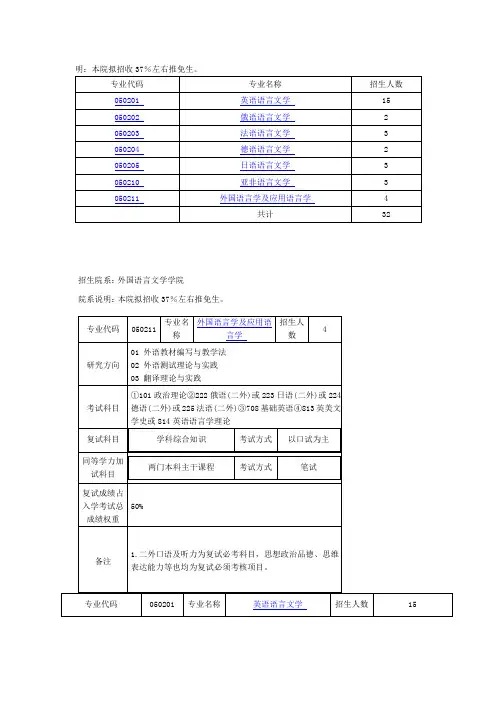
明:本院拟招收37%左右推免生。
招生院系:外国语言文学学院院系说明:本院拟招收37%左右推免生。
外国语言学及应用语言学专业介绍本授予点的学科带头人为朱永生教授。
现有教授12人,副教授36人。
博士生导师8人。
主要研究方向:1.外国语言学2.英汉语言比较3.第二语言习得4.英语教学近年来的主要科研成果:《系统功能语言学多维思考》,《功能语言学导论》,《语境动态研究》,《系统功能语言学概论》;《论说文入门》,《英汉写作修辞对比著》,《南北韩的语法研大学英语教学改革回顾、反思和研究》、《大学英语》(全新版)、《21世纪大学英语》等。
开设的主要专业课程:语言学概论、话语分析、应用语言学、社会语言学、对比语言学、语言测试、翻译学、英语阅读理论与实践、英语写作理论与实践等。
毕业生去向:毕业生主要从事英语专业以及大学英语的教学与研究。
英语语言文学专业介绍本专业创立于1905年,目前有英语语言文学博士点一个和英语语言文学博士后流动站一个,有教授13人,副教授11人。
本专业为上海市重点学科。
教师有着丰富的教学经验和较高的科研能力,曾多次获得国家及上海市教学科研奖项。
主要研究方向:①现代英语;②英美文学;③语言学;④双语词典编纂;⑤翻译学;⑥文艺理论近年来的主要科研成果:《英汉大词典》(第二版)、《英汉语篇衔接手段对比研究》、《系统功能语言学多维思考》、《认知语言学概论》、《英汉和汉英语义结构对比》、《英汉零前指现象对比研究》、《现代英汉翻译操作》、《莎士比亚十论》、《莎士比亚专题研究》、《莎评简史》、《语言科学探源》、《文本之外:由佩内洛普?菲茨杰拉德的小说及文学生涯看文学研究》、《矛盾情结与艺术模糊性:超越政治和族裔的美国华裔文学》等。
硕士生主要专业课程:英国小说、美国诗歌、翻译研究(上、下)、莎士比亚研究、文艺复兴与莎士比亚、美国小说研究、欧美小说艺术研究、英语语言史、认知语言学、语义学、西方语言学理论、符号学、话语分析、功能语言学、英语词典学、语用学。
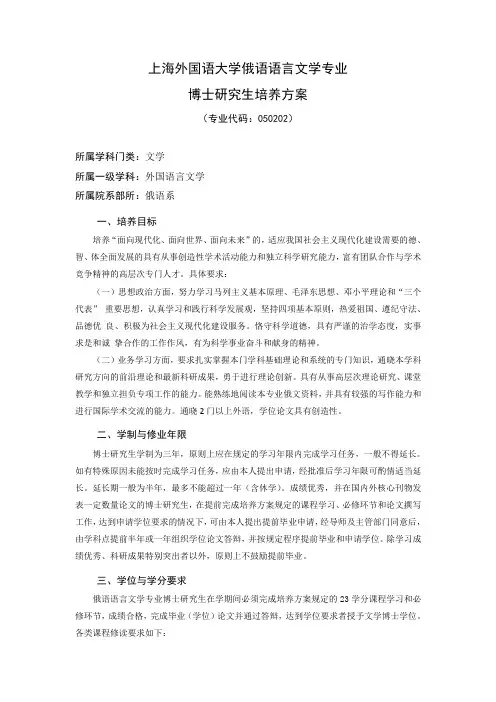
上海外国语大学俄语语言文学专业博士研究生培养方案(专业代码:050202)所属学科门类:文学所属一级学科:外国语言文学所属院系部所:俄语系一、培养目标培养“面向现代化、面向世界、面向未来”的,适应我国社会主义现代化建设需要的德、智、体全面发展的具有从事创造性学术活动能力和独立科学研究能力,富有团队合作与学术竞争精神的高层次专门人才。
具体要求:(一)思想政治方面,努力学习马列主义基本原理、毛泽东思想、邓小平理论和“三个代表”重要思想,认真学习和践行科学发展观,坚持四项基本原则,热爱祖国、遵纪守法、品德优良、积极为社会主义现代化建设服务。
恪守科学道德,具有严谨的治学态度,实事求是和诚挚合作的工作作风,有为科学事业奋斗和献身的精神。
(二)业务学习方面,要求扎实掌握本门学科基础理论和系统的专门知识,通晓本学科研究方向的前沿理论和最新科研成果,勇于进行理论创新。
具有从事高层次理论研究、课堂教学和独立担负专项工作的能力。
能熟练地阅读本专业俄文资料,并具有较强的写作能力和进行国际学术交流的能力。
通晓2门以上外语,学位论文具有创造性。
二、学制与修业年限博士研究生学制为三年,原则上应在规定的学习年限内完成学习任务,一般不得延长。
如有特殊原因未能按时完成学习任务,应由本人提出申请,经批准后学习年限可酌情适当延长。
延长期一般为半年,最多不能超过一年(含休学)。
成绩优秀,并在国内外核心刊物发表一定数量论文的博士研究生,在提前完成培养方案规定的课程学习、必修环节和论文撰写工作,达到申请学位要求的情况下,可由本人提出提前毕业申请,经导师及主管部门同意后,由学科点提前半年或一年组织学位论文答辩,并按规定程序提前毕业和申请学位。
除学习成绩优秀、科研成果特别突出者以外,原则上不鼓励提前毕业。
三、学位与学分要求俄语语言文学专业博士研究生在学期间必须完成培养方案规定的23学分课程学习和必修环节,成绩合格,完成毕业(学位)论文并通过答辩,达到学位要求者授予文学博士学位。
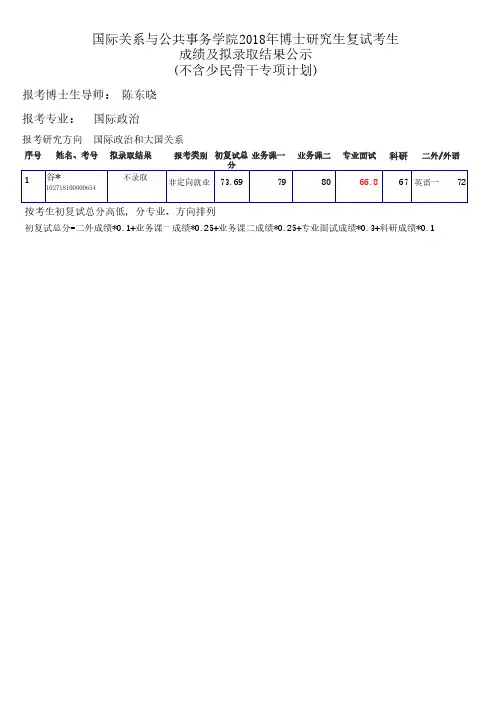
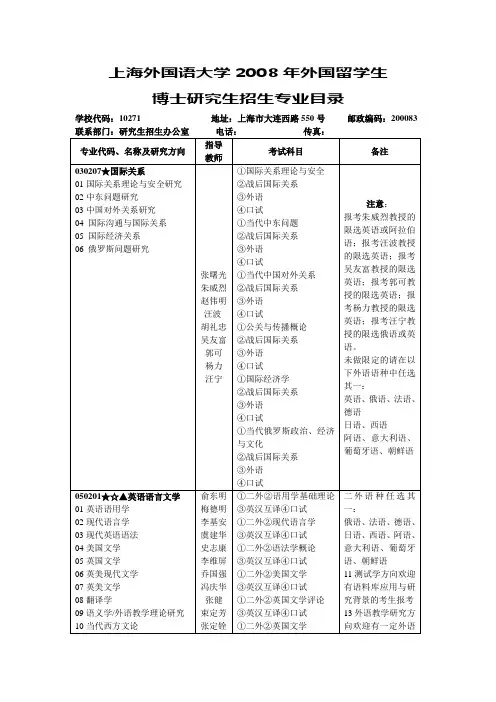
上海外国语大学2008年外国留学生
博士研究生招生专业目录
学校代码:10271 地址:上海市大连西路550号邮政编码:200083 联系部门:研究生招生办公室电话:传真:
二外或外国语参考书目:
•英语:无参考书目,参考大学英语四、六级考试形式。
•俄语:《新编俄语教程》(1-3),上海外语教育出版社,2000-2002年版。
•法语:《公共法语》(上、下),上海外语教育出版社,1997年版。
•德语:《基础德语》,同济大学出版社,2000年版;《中级德语》,同济大学出版社,1990年版。
•日语:《新编日语》(1-3),上海外语教育出版社,2000年版。
•西语:《现代西班牙语》(1-2),董燕生,北外出版社,2000年版。
•阿语:《阿拉伯语》(1-4册),北京外语教育出版社。
•意大利语:暂无。
•葡萄牙语:《葡萄牙语语法》,上海外语教育出版社。
《旅游葡萄牙语》,北大出版社。
《葡语实用动词搭配词典及葡汉会话》(共2册),海南出版社。
•朝鲜语:暂无。
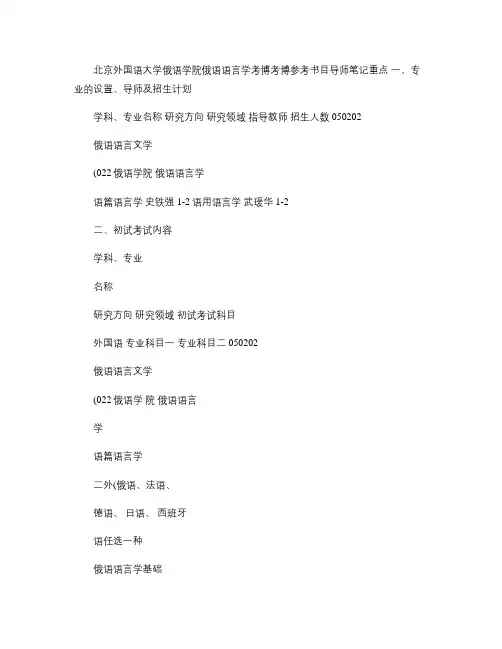
北京外国语大学俄语学院俄语语言学考博考博参考书目导师笔记重点一、专业的设置、导师及招生计划学科、专业名称研究方向研究领域指导教师招生人数 050202俄语语言文学(022俄语学院俄语语言学语篇语言学史铁强 1-2语用语言学武瑗华 1-2二、初试考试内容学科、专业名称研究方向研究领域初试考试科目外国语专业科目一专业科目二 050202俄语语言文学(022俄语学院俄语语言学语篇语言学二外(俄语、法语、德语、日语、西班牙语任选一种俄语语言学基础语篇语言学语用语言学语用语言学三、参考书目研究方向参考书目俄语语篇语言学 (俄语学院史铁强教授 1、ГальперинИ.Р.Тексткакобъектлингвистическогоисследования.М.,1981.2、ШевченкоН.В.Основылингвистикитекста:Учебноепособие.М.,2003.3、胡壮麟:《语篇的衔接与连贯》 ,上海:上海外语教育出版社, 1994年。
4、王福祥:《话语语言学概论》 ,北京:外语教学与研究出版社, 1994年。
5、史铁强等:《语篇语言学概论》 ,北京:外语教学与研究出版社, 2012。
俄语语用语言学 1、Русскаяграмматика.т.I, т.II.АкадемиянаукСССР.М.,1980.2、张家骅:《语法·语义·语用——现代俄语研究》 ,哈尔滨:黑龙江人民出版(俄语学院武瑗华教授社, 2000年。
3、何自然:《语用学概论》 ,长沙:湖南教育出版社, 1988年。
4、何兆熊:《语用学概要》 ,上海:上海外语教育出版社, 1989年。
5、索振羽:《语用学教程》 ,北京:北京大学出版社, 2000年。
四、关于北京外国语学院考博注意事项(一报考类别,包括以下两种类型:①非定向:录取后没有保持人事关系的正式工作单位,读博期间个人人事档案及户口转入学校 (户口是否转入自愿,毕业后在国家政策指导下自主择业。
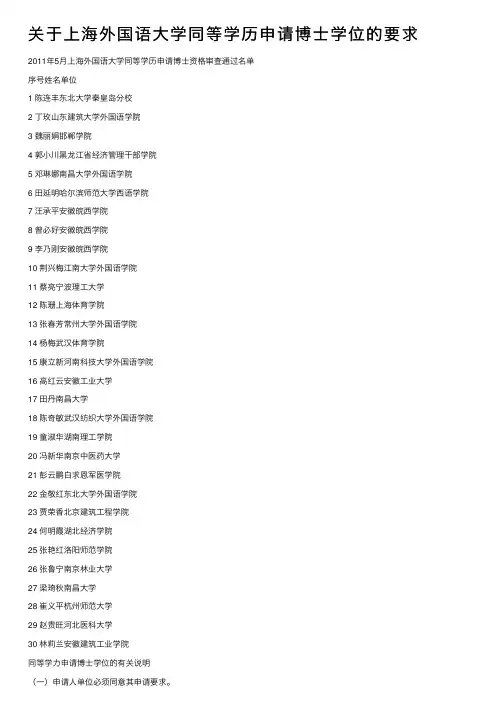
关于上海外国语⼤学同等学历申请博⼠学位的要求2011年5⽉上海外国语⼤学同等学历申请博⼠资格审查通过名单序号姓名单位1 陈连丰东北⼤学秦皇岛分校2 丁玫⼭东建筑⼤学外国语学院3 魏丽娟邯郸学院4 郭⼩川⿊龙江省经济管理⼲部学院5 邓琳娜南昌⼤学外国语学院6 ⽥延明哈尔滨师范⼤学西语学院7 汪承平安徽皖西学院8 曾必好安徽皖西学院9 李乃刚安徽皖西学院10 荆兴梅江南⼤学外国语学院11 蔡亮宁波理⼯⼤学12 陈珊上海体育学院13 张春芳常州⼤学外国语学院14 杨梅武汉体育学院15 康⽴新河南科技⼤学外国语学院16 ⾼红云安徽⼯业⼤学17 ⽥丹南昌⼤学18 陈奇敏武汉纺织⼤学外国语学院19 童淑华湖南理⼯学院20 冯新华南京中医药⼤学21 彭云鹏⽩求恩军医学院22 ⾦敬红东北⼤学外国语学院23 贾荣⾹北京建筑⼯程学院24 何明霞湖北经济学院25 张艳红洛阳师范学院26 张鲁宁南京林业⼤学27 梁琦秋南昌⼤学28 崔义平杭州师范⼤学29 赵贵旺河北医科⼤学30 林莉兰安徽建筑⼯业学院同等学⼒申请博⼠学位的有关说明(⼀)申请⼈单位必须同意其申请要求。
(⼆)申请⼈必须已获得硕⼠学位,并在获得硕⼠学位后⼯作五年以上。
(三)申请⼈应在教学、科研、专门技术领域做出突出成绩,在申请学位的学科领域独⽴发表过⾼⽔平的学术论⽂,或出版过⾼⽔平的专著,且其教学科研成果获得国家级或省部级以上奖励。
(四)申请⼈修完我校规定的所有学分,成绩合格并有效(所有成绩有效期4年)。
(五)申请⼈必须已基本完成博⼠论⽂初稿。
⼆、申请时提交材料:具备申请博⼠学位基本条件的同等学⼒⼈员,在修完我校规定博⼠⽣课程后,应向我校提交以下材料:1.硕⼠学位证书及最后学历证明;2.准备申请博⼠学位的学位论⽂初稿;3.公开发表的核⼼期刊有关学术论⽂两篇(核⼼期刊以教育部社政司审定的南京⼤学“中⽂社会科学引⽂索引”(CSSCI)项⽬研究组确定的期刊分类⽅法为准)以及其他科研成果(如出版的专著等);4. 省部级科研成果获奖的证明材料(科研成果必须由省部级政府部门颁发);5.填写《上海外国语⼤学同等学⼒申请博⼠学位资格审查表》,包括申请⼈所在单位向学位授予单位介绍申请⼈的简历、思想政治表现、⼯作成绩、科研成果、业务能⼒、理论基础、专业知识和外语程度等⽅⾯情况的材料;6.两位教授或相当专业技术职业专家的推荐书(加印密封),其中⾄少有⼀名博⼠⽣指导教师;我校将组织专家⼩组对申请⼈进⾏资格审查,以确认申请⼈是否具有申请资格。
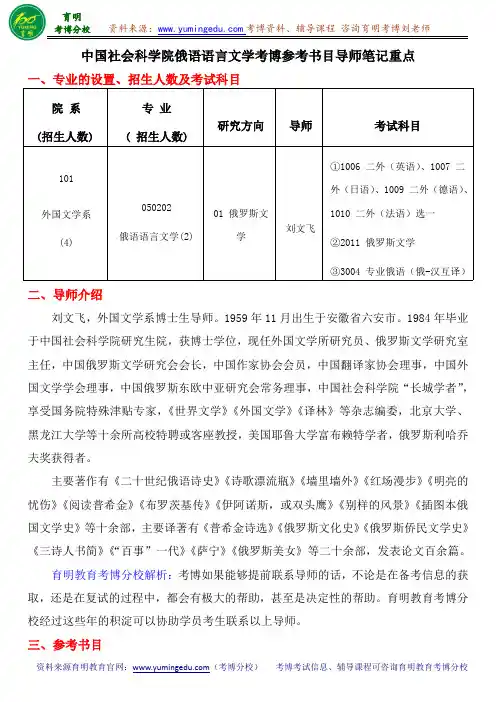
中国社会科学院俄语语言文学考博参考书目导师笔记重点一、专业的设置、招生人数及考试科目院系(招生人数)专业(招生人数)研究方向导师考试科目101外国文学系(4)050202俄语语言文学(2)01俄罗斯文学刘文飞①1006二外(英语)、1007二外(日语)、1009二外(德语)、1010二外(法语)选一②2011俄罗斯文学③3004专业俄语(俄-汉互译)二、导师介绍刘文飞,外国文学系博士生导师。
1959年11月出生于安徽省六安市。
1984年毕业于中国社会科学院研究生院,获博士学位,现任外国文学所研究员、俄罗斯文学研究室主任,中国俄罗斯文学研究会会长,中国作家协会会员,中国翻译家协会理事,中国外国文学学会理事,中国俄罗斯东欧中亚研究会常务理事,中国社会科学院“长城学者”,享受国务院特殊津贴专家,《世界文学》《外国文学》《译林》等杂志编委,北京大学、黑龙江大学等十余所高校特聘或客座教授,美国耶鲁大学富布赖特学者,俄罗斯利哈乔夫奖获得者。
主要著作有《二十世纪俄语诗史》《诗歌漂流瓶》《墙里墙外》《红场漫步》《明亮的忧伤》《阅读普希金》《布罗茨基传》《伊阿诺斯,或双头鹰》《别样的风景》《插图本俄国文学史》等十余部,主要译著有《普希金诗选》《俄罗斯文化史》《俄罗斯侨民文学史》《三诗人书简》《“百事”一代》《萨宁》《俄罗斯美女》等二十余部,发表论文百余篇。
育明教育考博分校解析:考博如果能够提前联系导师的话,不论是在备考信息的获取,还是在复试的过程中,都会有极大的帮助,甚至是决定性的帮助。
育明教育考博分校经过这些年的积淀可以协助学员考生联系以上导师。
三、参考书目专业课信息应当包括一下几方面的内容:第一,关于参考书和资料的使用。
这一点考生可以咨询往届的博士学长,也可以和育明考博联系。
参考书是理论知识建立所需的载体,如何从参考书抓取核心书目,从核心书目中遴选出重点章节常考的考点,如何高效的研读参考书、建立参考书框架,如何灵活运用参考书中的知识内容来答题,是考生复习的第一阶段最需完成的任务。
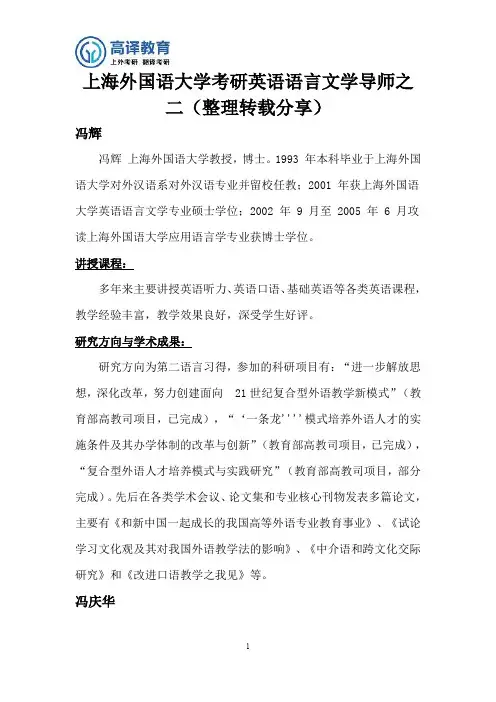
上海外国语大学俄语语言文学专业博士研究生培养方案(专业代码:050202)所属学科门类:文学所属一级学科:外国语言文学所属院系部所:俄语系学科专业简介:上海外国语大学俄语语言文学学科的历史可以追溯到1949年成立的上海俄文专科学校。
本学科点是中国俄语教学研究会的发起单位之一和首届会长单位,是全国第一个获得俄语语言文学博士学位授予权(1983)的学科点,1987年被国家教委列为全国俄语语言文学第一个重点学科,2001年被上海市教委评定为上海市重点学科,2002年和2007年又连续被列为国家重点学科,2009年入选国家级特色专业。
学科点设有教育部直属俄语中心、教育部国际合作与交流司区域国别研究基地上海外国语大学俄罗斯研究中心和俄罗斯俄语世界基金中心。
一、培养目标培养“面向现代化、面向世界、面向未来”的,适应我国社会主义现代化建设需要的德、智、体全面发展的具有从事创造性学术活动能力和独立科学研究能力,富有团队合作与学术竞争精神的高层次专门人才。
具体要求:(一)思想政治方面,努力学习马列主义基本原理、毛泽东思想、邓小平理论和“三个代表”重要思想,认真学习和践行科学发展观,坚持四项基本原则,热爱祖国、遵纪守法、品德优良、积极为社会主义现代化建设服务。
恪守科学道德,具有严谨的治学态度,实事求是和诚挚合作的工作作风,有为科学事业奋斗和献身的精神。
(二)业务学习方面,要求扎实掌握本门学科基础理论和系统的专门知识,通晓本学科研究方向的前沿理论和最新科研成果,勇于进行理论创新。
具有从事高层次理论研究、课堂教学和独立担负专项工作的能力。
能熟练地阅读本专业俄文资料,并具有较强的写作能力和进行国际学术交流的能力。
通晓2门以上外语,学位论文具有创造性。
二、学制与修业年限博士研究生学制为三年,原则上应在规定的学习年限内完成学习任务,一般不得延长。
如有特殊原因未能按时完成学习任务,应由本人提出申请,经批准后学习年限可酌情适当延长。
上外考研俄语语言文学名师介绍一、季元龙个人介绍:季元龙,男,1951年出生。
上海外国语大学俄语系教授。
学历教育/进修与访学:1975年7月毕业于原上海外国语学院俄语系俄语语言文学专业,1989年赴俄罗斯莫斯科普希金俄语学院进修。
工作简历:1975年至今上海外国语大学俄语系任教;曾担任过俄语系实践课教研室主任一职;教学课程:低年级俄语实践课、听力课、泛读课;高年级俄语实践课、报刊阅读课;研究生俄语词汇学、俄语语言国情学等。
研究方向:俄语语言国情学以及教学法的研究科研项目:2002年俄语语言国情学获上海市重点学科建设规划项目立项主要科研成果:编著教材:《新编俄语教程》;《俄语写作课》;《俄语语言国情学》等。
论文:《一门新兴的语言学科:俄语语言国情学》;《俄罗斯诗歌中的纪念碑情结》;《俄语测试刍议》;《评1991年全国高考俄语试卷》;《俄语课堂交际活动的若干形式》;《专业俄语教学中的若干问题及对策》;《关于“世界”与“和平”》;《九十年代报刊俄语构词的新趋向》;《俄语词汇释义的若干手段》;《俄语成语在低年级教学过程中的运用》;《俄语中含те,де外来词读法小议》;《俄语理论语义学的研究原则,对象及其方法——阿普列观点评述》。
科研与教学奖励:1997年获得学校“育才”奖。
陆永昌个人介绍:1950年出生,江苏扬州人。
上海外国语大学俄语系教授,翻译专业研究生导师。
上海市作家协会会员,上海市翻译家协会会员。
学历教育/进修与访学:1965年进入泰州师范(后更名为泰州师范专科学校)师范毕业后,弃笔从戎,军旅生活使一个普通战斗员变成一个基层指挥员,之后进入上海外国语学院(后更名为上海外国语大学)学习,毕业后留校任教至今。
工作简历:1972 年至今上海外国语大学俄语系教师;1982年至1986年曾在上海市政府教育卫生办公室工作;1991年至1993年受国家教委委派往俄罗斯莫斯科国立语言大学翻译系任教;回国后继续在上海外国语大学执教,历任上海外国语学院高年级教研室主任、理论教研室主任、系办公室主任。
考研择校上海外国语大学俄语系上海外国语大学俄语系的前身是上海俄文专科学校,创建于1949年。
俄语系现有两个专业:俄语语言文学和乌克兰语言文学专业。
俄语语言文学是全国第一个获得俄语语言文学博士学位授予权(1983)的学科点,也是全国俄语语言文学第一个国家重点学科(1987),2001年被上海市教委评定为上海市重点学科,2002年和2007年又连续被列为国家重点学科,2009年入选国家级特色专业。
俄语系设有俄罗斯语言文化研究基地、教育部直属俄语中心和俄罗斯俄语世界基金会设俄语中心,拥有一个博士后流动站(外国语言文学一级学科)。
俄语语言文学学科拥有一支业务精良、教学和科研成就突出的师资队伍。
现有博士生导师5名、教授10名、副教授15名;教师中具有博士学位者25名;学科常年聘请俄罗斯专家,所有教师具有海外留学经历;校各级学科骨干16名。
俄语系在巩固俄语语言学、俄罗斯文学、俄汉/汉俄翻译理论和汉俄词典编撰等研究领域的传统优势和特色基础上,又根据社会发展和学科建设的需要,新增俄罗斯社会与文化研究方向。
近年来承担国家社科基金项目6项,省部级项目10项,国际合作项目3项,完成了一系列具有相当分量的学术著作和论文。
新版《汉俄大词典》荣获上海市第十届哲学社会科学优秀成果(著作类)一等奖。
俄语系同俄罗斯的莫斯科大学、圣彼得堡大学、俄罗斯科学院高尔基世界文学研究所、莫斯科语言大学、俄罗斯赫尔岑师范大学、俄罗斯远东大学、俄罗斯高尔基文学院、乌克兰基辅大学等高校和科研机构保持长期的密切合作关系。
近年来,俄语系共举办国际研讨会6次(含合办1次),国内研讨会4次,全国及南方地区俄语大赛6次,邀请国内专家讲学10人次,做学术报告13场,邀请国外专家讲学26人次,做学术报告64场。
老师整理了几个节约时间的准则:一是要早做决定,趁早备考;二是要有计划,按计划前进;三是要跟时间赛跑,争分夺秒。
总之,考研是一场“时间战”,谁懂得抓紧时间,利用好时间,谁就是最后的胜利者。
上海外国语大学2013年博士研究生入学考试英语(二外)试题(考试时间180分钟,满分100分,共6页)I.Grammar and Vocabulary (30%)Directions: From the four choices given, choose ONE to complete the sentence.Section A: Grammar (15%, @1%)1. The idea of traveling through space to other planets interests many people today.A. aB. theC. /D. one2. I this soup. I pepper in it.A. am tasting… am tastingB. am tasting… tasteC. taste… am tastingD. taste…have tasted3. His remarks were annoy everybody at the meeting.A. such as toB. so as toC. such toD. as much as to4. James has just arrived, but I didn’t know he until yesterday.A. will comeB. was comingC. had been comingD. came5. There are as good fish in the sea ever came out of it.A. thanB. likeC. asD. so6. She fifty or so when I first met her at the conference.A. must beB. had beenC. could beD. must have been7. I’m surprised at there an index.A. not to beB. to be notC. not beingD. being not8. The activities of the international marketing researcher are frequently much broader than .A. the domestic marketer hasB. those of the domestic marketerC. the domestic marketer doesD. that which as the domestic marketer9. It is imperative that the government more investment into the shipbuilding industry.A. attractsB. shall attractC. attractD. has to10. John often sits in a small bar, drinking and smoking considerably more .A. than that he is healthyB. than good for his healthC. than his health couldD. than is good for his health11. This girl is Mary’s cousin.A. little pretty SwedishB. Swedish litter prettyC. Swedish pretty littleD. pretty little Swedish12. The less the surface of the ground yields to the weight of the body of a runner, to the body.A. the greater the stressB. the stress is greaterC. greater the stress isD. greater is the stress.13.The square itself is five hundred yards wide, five times ____ the size of St. Peter's in Rome.A. /B. that ofC. which isD. of14. What annoys me is that tomorrow the third time I take my car in to be repaired.A. is … have toB. will be … have toC. is … will have toD. will be … have to15. There has not been a great response to the sale, ?A. does itB. has itC. does thereD. has thereSection B Vocabulary (15%, @1%)1. You can go to a travel agency and ask for a holiday _____.A. introductionB. advertisementC. bookD. brochure2. A great amount of work has gone into _______ the Cathedral to its previous splendor.A. refreshingB. restoringC. renovatingD. renewing3. The tone of the article ________ the writer’s mood at the time.A. reproducedB. reflectedC. imaginedD. imitated4. The job of a student accommodation officer_______ a great many visits to landladies.A. concernsB. offersC. asksD. involves5. It was strange that she would _____ such an absurd idea.A. allowB. stickC. takeD. entertain6. After the heavy rain, a builder was called to repair the roof, which was ______.A. leakingB. tricklingC. prominentD. noticeable7. The reception was attended by ______ members of the local community.A. excellentB. conspicuousC. prominentD. noticeable8. The football match was _____ because of the heavy rain.A. called overB. called upC. called outD. called off9. Many people nowadays save money to ______ for their old age.A. caterB. supplyC. provideD. equip10.She’s always been kind to me –I can’t just turn _______on her now that she needs my help.A. my backB. my headC. my eyeD. shoulder11. The bar in the club is for the ______use of its members.A. extensiveB. exclusiveC. inclusiveD. comprehensive12. His long beard is a _____ joke among his friends.A. steadyB. standingC. settledD. stable13. Until I took Dr Macy’s class, I was an underachieving student, but I left that class never to underachieve again.A. concernedB. worriedC. determinedD. decided14. The Dragon Boat Festival on the fifth day of the fifth lunar month.A. fallsB. arrivesC. dropsD. happens15. The tuition fees are ______ to students coming from low-income families.A. approachableB. payableC. reachableD. affordableII. Cloze Test (20%, @1%)Directions: For each blank in the following passage, there are four choices marked A, B, C and D. Read the passage and choose the best answer for each blank.Most worthwhile careers require some kind of specialized training. Ideally, therefore, the choice of an _1_ should be made even before the choice of a curriculum in high school. Actually, _2_, most people make several job choices during their working lives, _3_ because of economic and industrial changes and partly to improve _4_ positions. The ―one perfect job‖ does not exist. Young people should _5_ enter into a broad flexible training program that will _6_ them for a field of work rather than for a single _7_. Unfortunately many young people have to make career plans _8_ benefit of help from a competent vocational counselor or psychologist. Knowing _9_ about the occupational world, or themselves for that matter, they choose their lifework on a hit-or-miss _10_. Some drift from job to job. Others _11_ to work in which they are unhappy and for which they are not fitted.One common mistake is choosing an occupation for _12_ real or imagined prestige. Too manyhigh-school students --- or their parents for them --- choose the professional field, _13_ both the relatively small proportion of workers in the professions and the extremely high educational and personal _14_. The imagined or real prestige of a profession or a ―white-collar‖ job is _15_ good reason for choosing it as lifework. _16_, these occupations are not always well paid. Since a large proportion of jobs are in mechanical and manual work, the _17_ of young people should give serious _18_ to these fields. Before making an occupational choice, a person should have a general idea of what he wants _19_ life and how hard he is willing to work to get it. Some people desire social prestige, others intellectual satisfaction. Some want security; others are willing to take _20_ for financial gain. Each occupational choice has its demands as well as its rewards.1. A. identification B. entertainment C. accommodation D. occupation2. A. however B. therefore C. though D. thereby3. A. entirely B. mainly C. partly D. largely4. A. its B. his C. our D. their5. A. since B. therefore C. furthermore D. forever6. A. prepare B. fit C. take D. leave7. A. job B. way C. means D. company8. A. to B. for C. without D. with9. A. little B. few C. much D. a lot10.A. chance B. basis C. purpose D. opportunity11.A. apply B. appeal C. stick D. turn12.A. our B. its C. your D. their13.A. concerning B. following C. considering D. disregarding14.A. preference B. requirements C. tendencies D. ambitions15.A. a B. any C. no D. the16.A. Therefore B. However C. Nevertheless D. Moreover17.A. majority B. mass C. minority D. multitude18.A. proposal B. suggestion C. consideration D. appraisal19.A. towards B. against C. out of D. without20.A. turns B. parts C. choices D. risksIII. Reading Comprehension(10%, @1%)Directions: In this part there are two passages. Each passage is followed by five questions. Read the passages carefully and choose the best answer to each question.Passage OneForget the Marlboro man: China is the world’s cigarette king. The mainland produces—and consumes —more tobacco products than any other country in the world. The China National Tobacco Corporation (CNTC), the state-run cash cow that holds an effective monopoly on the industry, is a source of good business for the party: in 2010, Big Tobacco paid 498.85 billion yuan (around $75 billion) in taxes to the Chinese government, according to the State Tobacco Monopoly Administration. More than 300 million Chinese adults smoke — among them more than half of all Chinese men. In 2009, the CNTC says, it produced a whopping 2.3 trillion cigarettes.But all this puffing is sparking serious public-health questions, and experts are now questioning if short-term profits will soon be outweighed by long-term health costs to the state. The World Lung Foundation (WLF) estimates a million people will die from tobacco-related illness in China this year, a toll that’s expected to double by 2020. So far there’s been little oversight of the industry: the Monopoly is, in essence, responsible for tobacco-control efforts. As the WLF’s Dr. Judith Mackay says, it’s been “a bit likeputting a fox in charge of a chicken coop”.No longer. Along with a team of researchers, Yang Gonghuan, the deputy director-general of China’s Center for Disease Control, has published a new report laying out how tobacco is a big drag on the country. Profits from producing cigarettes will fall far short of the eventual health costs of smoking-related illnesses, says Yang. By the report’s estimation, cigarette-industry revenue accounts for some 6.7 perc ent of Beijing’s income. By contrast, the report states that tobacco ―overall poses a loss rather than a benefit to China‖, and other research puts estimated costs from tobacco at about 25 percent more than the revenue generated by the industry.Experts say the report falls in line with an immature awareness of the dangers of tobacco across the country. But for now, the practice of putting warning pictures on cigarette packs — which is working to curb smoking in Latin America —is a long way off. The public-health question for Beijing, then, is whether cashing in on tobacco now will be consumed by the hospital beds that will have to be bought later.1. China is the world’s cigarette king because of ______.A. the greatest amount of tax from cigarette industryB. the greatest number of adult smokersC. the greatest production and consumption of tobaccosD. the most tobacco-related illness2. ―Cash cow‖ in the first paragraph refers to ______.A. Chinese governmentB. China National Tobacco CorporationC. adult smokersD. World Lung Foundation3. What is the implied meaning of the italic words ―a bit like putting a fox in charge of a chicken coop‖ inparagraph two?A. It is unlikely for smokers to give up smoking actively.B. It is impossible to prevent the tobacco-related illness.C. It is impossible to decrease the long-term health costs of tobacco.D. It is impossible for government to control tobacco effectively.4. Which of the following statements is INCORRECT according to the passage?A. Putting warning pictures on cigarette packs is an effective way of tobacco-control in LatinAmerica.B. China is lacking in effective mechanism for tobacco-control.C. Common Chinese has full knowledge about the harm of tobacco.D. Cigarette industry generates more loss than revenue.5. Which of the following can be the best title of the passage?A. Tobacco and Public HealthB. The King of CigaretteC. Smoking All the ProfitsD. Tobacco ControlPassage twoDespite D enmark’s manifest virtues, Danes never talk about how proud they are to be Danes. This would sound weird in Danish. When Danes talk to foreigners about Denmark, they always begin by commenting on its tininess, its unimportance, the difficulty of its language, the general small-mindedness and self-indulgence of their countrymen and the high taxes. No Dane would look you in the eye and say, ―Denmark is a great country.‖ You’re supposed to figure this out for yourself.It is the land of the silk safety net, where almost half the national budget goes toward smoothing out life’s inequalities, and there is plenty of money for schools, day care, retraining programmes, job seminars – Danes love seminars: three days at a study centre hearing about waste management is almost as good as a ski trip. It is a culture bombarded by English, in advertising, pop music, the Internet, and despite all the English that Danish absorbs –there is no Danish Academy to defend against it –old dialects persist in Jutland that can barel y be understood by Copenhageners. It is the land where, as the saying goes, ―Few have too much and fewer have too little,‖ and a foreigner is struck by the sweet egalitarianism that prevails, where the lowliest clerk gives you a level gaze, where Sir and Madame have disappeared from common usage, even Mr and Mrs. It’s a nation of recyclers –about 55% of Danish garbage gets made into something new –and no nuclear power plants. It’s a nation of tireless planners. Trains run on time. Things operate well in general.Such a nation of overachievers –a brochure from the Ministry of Business and Industry says, ―Denmark is one of the world’s cleanest and most organized countries, with virtually no pollution, crime, or poverty. Denmark is the most corruption-free s ociety in the Northern Hemisphere.‖ So, of course, one’s heart lifts at any sighting of Danish sleaze: skinhead graffiti on buildings (―Foreigners Out of Denmark!‖), broken beer bottles in the gutters, drunken teenagers slumped in the park.Nonetheless, it is an orderly land. You drive through a Danish town, it comes to an end at a stone wall, and on the other side is a field of barley, a nice clean line: town here, country there. It is not a nation of jaywalkers. People stand on the curb and wait for the r ed light to change, even if it’s 2 a.m. and there’s not a car in sight. However, Danes don’t think of themselves as a waiting-at-2-a.m.-for-the-green-light people –that’s how they see Swedes and Germans. Danes see themselves as jazzy people, improvisers, m ore free spirited than Swedes, but the truth is (though one should not say it) that Danes are very much like Germans and Swedes. Orderliness is a main selling point. Denmark has few natural resources, limited manufacturing capability; its future in Europe will be as a broker, banker, and distributor of goods. You send your goods by container ship to Copenhagen, and these bright, young, English-speaking, utterly honest, highly disciplined people will get your goods around to Scandinavia, the Baltic States, and Russia. Airports, seaports, highways, and rail lines are ultramodern and well-maintained.The orderliness of the society doesn’t mean that Danish lives are less messy or lonely than yours or mine, and no Dane would tell you so. You can hear plenty about bitter family feuds and the sorrows of alcoholism and about perfectly sensible people who went off one day and killed themselves. An orderly society cannot exempt its members from the hazards of life.But there is a sense of entitlement and security that Danes grow up with. Certain things are yours by virtue of citizenship, and you shouldn’t feel bad for taking what you’re entitled to, you’re as good as anyone else. The rules of the welfare system are clear to everyone, the benefits you get if you lose your job, the steps you take to get a new one; and the orderliness of the system makes it possible for the country to weather high unemployment and social unrest without a sense of crisis.6.The author thinks that Danes adopt a _______ attitude towards their country.A.boastfulB.modestC.deprecatingD.mysterious7.Which of the following is NOT a Danish characteristic cited in the passage?A.Fondness of foreign culture.B.Equality in society.C.Linguistic tolerance.D.Persistent planning.8.The author’s reaction to the sta tement by the Ministry of Business and Industry is .A.disapproving.B.approving.C.noncommittal.D.doubtful.9.According to the passage, Danish orderliness .A.sets the people apart from Germans and Swedes.B.spares Danes social troubles besetting other peoples.C.is considered economically essential to the country.D.prevents Danes from acknowledging existing troubles.10.At the end of the passage the author states all the following EXCEPT that .A.Danes are clearly informed of their social benefits.B.Danes take for granted what is given to them.C.the open system helps to tide the country over.D.orderliness has alleviated unemployment.IV. Translation (20%)Directions: Translate the following passage into Chinese.Whether work should be placed among the causes of happiness or among the causes of unhappiness may perhaps be regarded as doubtful question. There is certainly much work which is exceedingly irksome, and an excess of work is always very painful. I think, however, that provided work is not excessive in amount, even the dullest work is to most people less painful than idleness. There are in work all grades, from mere relief of tedium up to the profoundest delights, according to the nature of the work and the abilities of the worker. Most of the work that most people have to do is not in itself interesting, but even such work has certain great advantages. To begin with, it fills a good many hours of the day without the need of deciding what one shall do. Most people, when they are left free to fill their own time according to their choice, are at a loss to think of anything sufficiently pleasant to be worth doing. And whatever they decide on, they are troubled by the feeling that something else would have been pleasanter. To be able to fill leisure intelligently is the last product of civilization, and at present very few people have reached this level.V. Writing(20%)Directions: Write an essay of about 200 words according to the following prompt. A title is needed.Many people will walk in and out of our lives; but only true friends leave footprints in our hearts. Friends are our truest treasures. What is your understanding of true friend?The following statements are for your reference.1.What is a friend? A single soul dwelling in two bodies. --- Aristotle2.In prosperity our friends know us; in adversity we know our friends. --- Churton Collins。